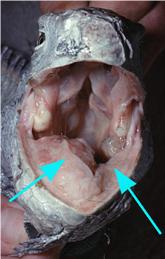Difference between revisions of "Lizard Oral Granuloma"
| (2 intermediate revisions by 2 users not shown) | |||
| Line 3: | Line 3: | ||
[[Image:Oral_granuloma.jpg|300px|thumb|right|'''A large swelling can be seen on the lower jaw accompanied by several abscesses along the upper gingiva''' (Copyright © RVC)]] | [[Image:Oral_granuloma.jpg|300px|thumb|right|'''A large swelling can be seen on the lower jaw accompanied by several abscesses along the upper gingiva''' (Copyright © RVC)]] | ||
| − | Oral abscesses are not uncommon in captive lizards. They may occur as an extension of periodontal disease or due to [[Lizard Traumatic Wounds|trauma]]. The main cause is a bacterial infection. | + | Oral abscesses are not uncommon in captive lizards. They may occur as an extension of [[Lizard Periodontal Disease|periodontal disease]] or due to [[Lizard Traumatic Wounds|trauma]]. The main cause is a bacterial infection. |
*'''Clinical signs''' include swelling and anorexia. | *'''Clinical signs''' include swelling and anorexia. | ||
*'''Diagnosis''' - history, [[Lizard Physical Examination|physical examination]], culture and radiology. | *'''Diagnosis''' - history, [[Lizard Physical Examination|physical examination]], culture and radiology. | ||
*'''Treatment''' - surgical debridement and antibiotics as indicated by culture. | *'''Treatment''' - surgical debridement and antibiotics as indicated by culture. | ||
| − | *'''Prevention''' - Appropriate [[ | + | *'''Prevention''' - Appropriate [[Reptile Diet Composition|diet]]. |
[[Category:Lizard_Gastrointestinal_Diseases|O]] | [[Category:Lizard_Gastrointestinal_Diseases|O]] | ||
Latest revision as of 12:19, 18 August 2010
| This article has been peer reviewed but is awaiting expert review. If you would like to help with this, please see more information about expert reviewing. |
Oral abscesses are not uncommon in captive lizards. They may occur as an extension of periodontal disease or due to trauma. The main cause is a bacterial infection.
- Clinical signs include swelling and anorexia.
- Diagnosis - history, physical examination, culture and radiology.
- Treatment - surgical debridement and antibiotics as indicated by culture.
- Prevention - Appropriate diet.
